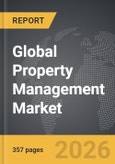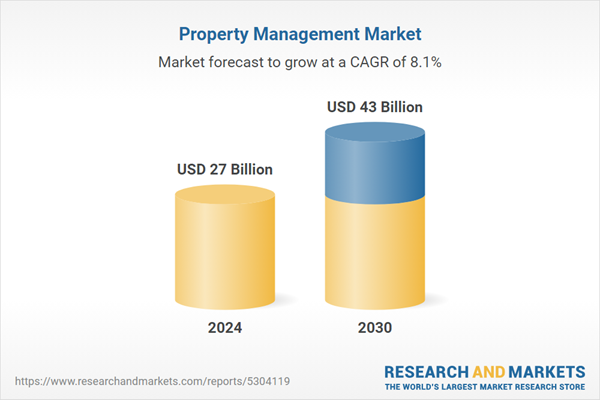Global Property Management Market - Key Trends & Drivers Summarized
What is Property Management, and Why is It Crucial for Real Estate Success?
Property management is the administration, operation, and oversight of real estate assets, including residential, commercial, and industrial properties. Property managers handle essential functions such as tenant acquisition and retention, rent collection, maintenance, and regulatory compliance, acting as intermediaries between property owners and tenants. Effective property management ensures that properties operate efficiently, retain their value, and generate steady income. As real estate investments continue to grow in complexity and value, the role of property management has expanded to include strategic services, such as financial planning, asset management, and tenant experience enhancement, which are vital for maintaining competitiveness in today's market.In addition to operational tasks, property management also plays a strategic role in maximizing property ROI (return on investment). By monitoring market trends, conducting regular property evaluations, and implementing preventive maintenance, property managers help owners make informed decisions that boost property value and reduce long-term costs. In sectors like commercial and multi-family residential properties, where tenant satisfaction is closely tied to occupancy rates and revenue, property management teams focus on enhancing tenant experiences through reliable service, timely repairs, and amenities. As real estate investment continues to expand, property management is essential in helping owners protect and grow their assets while ensuring stable, sustainable operations.
How Are Technological Advancements Transforming the Property Management Market?
Technological advancements, including cloud-based property management software, IoT (Internet of Things) devices, and artificial intelligence (AI), have revolutionized property management, making it more efficient, transparent, and scalable. Cloud-based property management platforms offer centralized tools for rent collection, lease management, maintenance tracking, and communication with tenants. These platforms enable property managers to streamline operations, access real-time data, and automate routine tasks, such as generating invoices, scheduling maintenance, and processing payments. Cloud technology also facilitates remote property management, allowing managers to oversee multiple properties from any location and reducing the need for physical presence on-site.IoT and AI further enhance property management by enabling proactive maintenance and predictive analytics. IoT sensors monitor building systems (such as HVAC, lighting, and water), sending alerts when maintenance is required, which helps reduce costs associated with repairs and minimizes disruptions for tenants. AI-powered analytics allow property managers to analyze market trends, tenant behaviors, and operational data to make data-driven decisions on rent adjustments, marketing strategies, and tenant retention initiatives. Smart home technology, which allows tenants to control lighting, temperature, and security systems remotely, is also becoming a competitive advantage in the residential market. Together, these technological advancements are transforming property management, allowing managers to operate more efficiently, improve tenant satisfaction, and make informed decisions to maximize property performance.
Why Are Property Owners and Investors Increasingly Relying on Professional Property Management Services?
Property owners and investors are increasingly turning to professional property management services to handle complex and time-intensive tasks, improve operational efficiency, and enhance asset value. Managing a property portfolio, whether residential, commercial, or mixed-use, involves balancing various responsibilities, such as tenant relations, property maintenance, legal compliance, and financial management. By outsourcing these tasks to property management firms, owners can leverage specialized expertise and industry knowledge to streamline operations and reduce the administrative burden. Professional property managers handle day-to-day operations and ensure that properties comply with local regulations and meet tenant expectations, minimizing potential liabilities for owners.In addition, professional property management is essential for optimizing financial performance and maintaining occupancy rates. Property managers use their understanding of the local market to set competitive rental rates, minimize vacancy periods, and identify qualified tenants, ensuring a steady income stream. Moreover, property management firms often use sophisticated financial reporting and analytics tools to track performance, identify cost-saving opportunities, and inform investment decisions. For institutional investors and real estate investment trusts (REITs) managing large-scale property portfolios, professional property management provides the structure, expertise, and resources necessary to operate properties at scale. This shift toward professional services is driven by the recognition that property management not only preserves asset value but actively contributes to achieving financial and operational goals.
What Factors Drive Growth in the Property Management Market?
The growth of the property management market is driven by expanding real estate investments, technological advancements, and rising tenant expectations for high-quality service and amenities. As global real estate investments continue to increase, particularly in commercial and multifamily residential sectors, the need for effective property management has grown. Investors are increasingly aware that well-managed properties deliver higher ROI, have lower tenant turnover, and are better protected against depreciation. This awareness is fueling demand for property management services that can handle operational complexities, ensure regulatory compliance, and maintain tenant satisfaction.Technological innovations have also accelerated growth in the property management market by making it easier for property managers to handle larger portfolios, reduce costs, and enhance the tenant experience. Cloud-based platforms, IoT, and AI have enabled property management firms to operate efficiently, monitor property health, and provide timely, personalized service to tenants. Additionally, tenants are demanding more from their rental experiences, expecting amenities, responsive maintenance, and digital convenience. Property managers are therefore adopting solutions that support tenant engagement, streamline communication, and enhance service quality, meeting modern standards of convenience and responsiveness. As these factors converge, the property management market is expanding, driven by the need for efficient, technology-enhanced services that meet the evolving expectations of both tenants and property owners.
Report Scope
The report analyzes the Property Management market, presented in terms of market value (US$ Thousand). The analysis covers the key segments and geographic regions outlined below.- Segments: Component (Solutions, Services); Deployment (Cloud, On-Premise); Application (Commercial, Residential).
- Geographic Regions/Countries:World; United States; Canada; Japan; China; Europe (France; Germany; Italy; United Kingdom; Spain; Russia; and Rest of Europe); Asia-Pacific (Australia; India; South Korea; and Rest of Asia-Pacific); Latin America (Argentina; Brazil; Mexico; and Rest of Latin America); Middle East (Iran; Israel; Saudi Arabia; United Arab Emirates; and Rest of Middle East); and Africa.
Key Insights:
- Market Growth: Understand the significant growth trajectory of the Property Management Solutions segment, which is expected to reach US$27.3 Billion by 2030 with a CAGR of a 7.7%. The Property Management Services segment is also set to grow at 8.9% CAGR over the analysis period.
Why You Should Buy This Report:
- Detailed Market Analysis: Access a thorough analysis of the Global Property Management Market, covering all major geographic regions and market segments.
- Competitive Insights: Get an overview of the competitive landscape, including the market presence of major players across different geographies.
- Future Trends and Drivers: Understand the key trends and drivers shaping the future of the Global Property Management Market.
- Actionable Insights: Benefit from actionable insights that can help you identify new revenue opportunities and make strategic business decisions.
Key Questions Answered:
- How is the Global Property Management Market expected to evolve by 2030?
- What are the main drivers and restraints affecting the market?
- Which market segments will grow the most over the forecast period?
- How will market shares for different regions and segments change by 2030?
- Who are the leading players in the market, and what are their prospects?
Report Features:
- Comprehensive Market Data: Independent analysis of annual sales and market forecasts in US$ Million from 2024 to 2030.
- In-Depth Regional Analysis: Detailed insights into key markets, including the U.S., China, Japan, Canada, Europe, Asia-Pacific, Latin America, Middle East, and Africa.
- Company Profiles: Coverage of players such as Accruent, AppFolio, ARCHIBUS, Archidata, Buildium and more.
- Complimentary Updates: Receive free report updates for one year to keep you informed of the latest market developments.
Some of the 33 companies featured in this Property Management market report include:
- Accruent
- AppFolio
- ARCHIBUS
- Archidata
- Buildium
- CIC
- Entrata
- FSI
- Hemlane
- Hitachi Vantara
- IBM
- Indus Systems
- iOFFICE
- JLL
- MCS Solutions
- OfficeSpace
- Oracle
- Planon
- PMX Dynamics
- Property Boulevard
- RealPage
- Rentec Direct
- SAP
- Total Management
- Trimble
- Yardi
This edition integrates the latest global trade and economic shifts into comprehensive market analysis. Key updates include:
- Tariff and Trade Impact: Insights into global tariff negotiations across 180+ countries, with analysis of supply chain turbulence, sourcing disruptions, and geographic realignment. Special focus on 2025 as a pivotal year for trade tensions, including updated perspectives on the Trump-era tariffs.
- Adjusted Forecasts and Analytics: Revised global and regional market forecasts through 2030, incorporating tariff effects, economic uncertainty, and structural changes in globalization. Includes historical analysis from 2015 to 2023.
- Strategic Market Dynamics: Evaluation of revised market prospects, regional outlooks, and key economic indicators such as population and urbanization trends.
- Innovation & Technology Trends: Latest developments in product and process innovation, emerging technologies, and key industry drivers shaping the competitive landscape.
- Competitive Intelligence: Updated global market share estimates for 2025, competitive positioning of major players (Strong/Active/Niche/Trivial), and refined focus on leading global brands and core players.
- Expert Insight & Commentary: Strategic analysis from economists, trade experts, and domain specialists to contextualize market shifts and identify emerging opportunities.
Table of Contents
Companies Mentioned (Partial List)
A selection of companies mentioned in this report includes, but is not limited to:
- Accruent
- AppFolio
- ARCHIBUS
- Archidata
- Buildium
- CIC
- Entrata
- FSI
- Hemlane
- Hitachi Vantara
- IBM
- Indus Systems
- iOFFICE
- JLL
- MCS Solutions
- OfficeSpace
- Oracle
- Planon
- PMX Dynamics
- Property Boulevard
- RealPage
- Rentec Direct
- SAP
- Total Management
- Trimble
- Yardi
Table Information
| Report Attribute | Details |
|---|---|
| No. of Pages | 357 |
| Published | February 2026 |
| Forecast Period | 2024 - 2030 |
| Estimated Market Value ( USD | $ 27 Billion |
| Forecasted Market Value ( USD | $ 43 Billion |
| Compound Annual Growth Rate | 8.1% |
| Regions Covered | Global |









